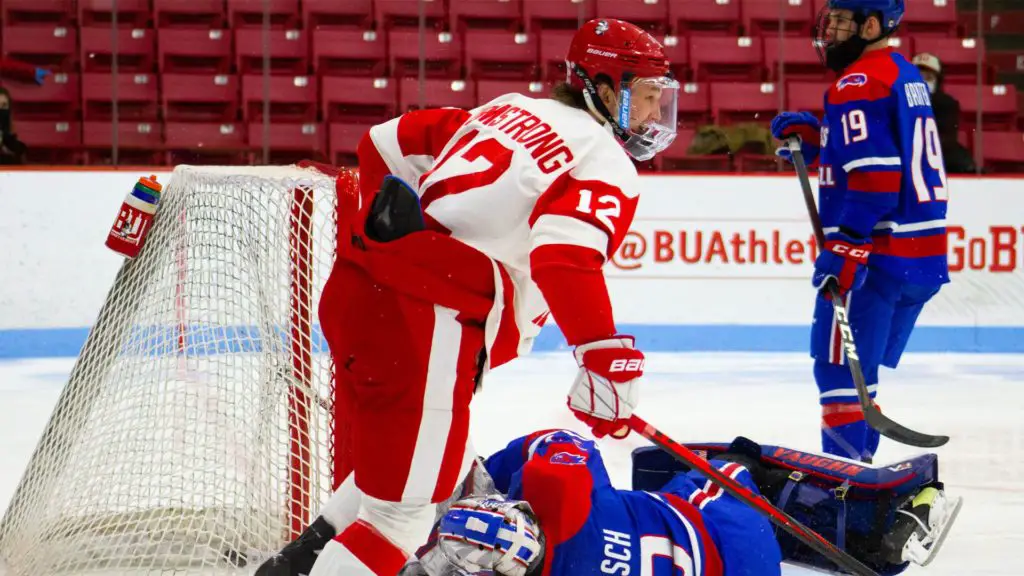
Each week during the season, we look at the big events and big games around Division I men’s college hockey in Tuesday Morning Quarterback.
Jim: Paula, this weekend was one that I hoped would help clarify the NCAA picture.
Instead, it muddied the waters.
Notre Dame lost to Penn State after having an early 2-0 lead. Bowling Green seemed in control of their series against Northern Michigan after a dominating win on Saturday, then got crushed on Sunday. Robert Morris likely killed their NCAA hopes losing to Niagara, but the Purple Eagles become a team that could knock off one of the bubble teams. And Boston University, after playing a severely shortened season, lost to UMass Lowell and placed themselves on the NCAA bubble.
After all these games were played, do you feel like the NCAA picture has become more difficult or less difficult to understand?
Paula: Jimmy, after this weekend’s results, I now feel as though the NCAA picture has become impossible to understand and there is a distinct possibility that the waters will get even murkier. I don’t envy the selection committee. And I’m having a hard time shaking the phrase “there will be significant subjectivity and flexibility used” from USCHO’s article about the selection committee memo from Feb. 16.
Last week, we parsed a bit of the flexibility and we talked around the idea of subjectivity without really having anything to anchor our conversations. This past weekend of play, coupled with what happened on the women’s side four tournament selection, has to make a lot of people nervous. What kind of flexibility? Subjectivity based on what?
Of all the results you listed, the one that has me thinking the hardest is Boston University’s loss. While the Terriers played just 15 games, they have a win over Boston College, they swept Massachusetts and put together an impressive short portfolio. Recently, though, they’ve also lost to Merrimack and five of their 15 games went to overtime. Does the committee consider the hardship of their shortened season – their literal inability to play more teams to perhaps improve their record – or does the committee look at their last couple of weeks, perceive a decline and maybe rule them out if they’re on the bubble at the end?
I’ve been advocating all season long for a more objective approach to perceived league strength, but even I am thinking, “Hey, that’s a pretty impressive season in a very strong league.”
Jim: Paula, you have read my mind.
I was certainly concerned about moments that might overly design or decide a season. Could we see a team do one thing that becomes highlight-reel material and that makes them more desirable to the NCAA field? Or go the opposite? Could a team play poorly in a game they are supposed to win and become marginalized?
I think that we all have to set a great social media moment aside and, in my opinion, we have to showcase those teams that have performed well. Does the next NCAA at-large come from a Big Ten conference or NCHC or Hockey East team?
Somehow, I feel more confident from these teams than a second-place Atlantic squad. Do you agree?
Paula: There is a lot I agree with there, Jimmy, but I’m still going to advocate for Army even though I realize that 1) I may be contradicting myself and 2) I may be fighting a losing battle.
What I agree with is that the committee should consider conference strength in determining the field, but I also think that the committee should be very careful about using that as a final deciding factor for bubble teams. It seems like a world of unfairness to me to discount a team like Army, with its current 13-game unbeaten streak and zero chance to prove itself outside of its league.
One of the things that struck me last week while prepping my Big Ten column was how each coach mentioned how singular each team’s experience has been this season. Coaches talked about the collective experience, about the way in which each conference has pulled together to protect its own teams and how NCAA hockey overall has worked to do what it can to make a season happen, but the extent to which each team had endured such unique experiences hadn’t yet occurred to me.
Every team that has achieved success this season deserves to have that success considered, regardless of its conference. I know I can’t have it both ways. I also know that the members of the selection committee bring their own biases to the process. They’re human. This particular bias – the traditional strength of conferences – can be presented as a more concrete, objective criteria. It’s an argument that can be made and doubtless will be made.
Jim: I love your approach.
The reality is that every team has to play the schedule with which they are presented. That is a good argument for a team like Army, but also an argument for why a team like Boston University deserves serious consideration.
The Terriers only played a grand total of 15 games, going 10-4-1. Yes, BU went 1-2-1 in their last four games, but prior to that, BU was 9-2-0. That begs the question, one that maybe was asked in the women’s selection process: Does how a team finishes the season matter?
The straight answer should be “No.” Record in last 20 or last 16 has been eliminated from the NCAA’s criteria for more than a decade. But, though criteria and guidance still exist, do we believe the committee will follow?
Paula: I like the use of the word “believe” there, Jimmy.
It’s what we’ve been discussing all season: Faith in the committee, faith that the process will be fair, faith that the most deserving 16 teams will make up the field, faith that the season would be played to completion.
In the end, though, we don’t have much more to go on other than speculating about what the committee will do. It’s all an act of faith. You and I have been around long enough and know some of the committee members well enough to trust that every situation will be considered fairly. Will that result in total justice for every team under consideration? I don’t think it will. I don’t think that’s possible.
For what it’s worth, I hate that we’re even contemplating the possibility of either Army or Boston University getting in – but that is one easily imagined scenario. And we haven’t yet ventured into a discussion about the ECAC. Is it fair and equitable for two teams from a four-team league to be included in the tournament when there’s a third bubble team from, say, Atlantic Hockey or the WCHA – or even a fourth team from the Big Ten – that has had to prepare for and battle through many more opponents only to be excluded in the end?
I’m not sure what criteria the committee will follow when faced with very difficult choices.
One thing our season-long discussion has shown me, though, is how much faith – that word again – that we have in the PairWise Rankings under normal circumstances and how much we crave the certainty of data and other more comfortably quantifiable criteria. There is one prediction that I’m willing to make, and that’s going forward, the hockey community will appreciate the PWR more. I also suspect that we’ll be able to use this year’s field to analyze future PWR-driven fields.
We’re all missing the certainty that we’ve come to love. Speculating about potential scenarios based on upsets with data to back us feels solid. Doing the same without a mechanism to quantify it feels personal, slippery, and very human.


